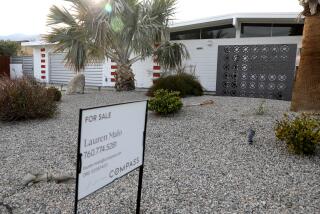THIS IS A JOB FOR . . . MYSTERY SHOPPER : Using assumed names and acting like buyers, ‘shoppers’ are hired by builders to evaluate sales offices and staff
- Share via
Martha Alvarado used to spend a lot of time looking at new homes--following colorful flags and signs, browsing through elaborately decorated models and chatting with agents in their sales offices.
But Alvarado was not a looky-loo. She was working undercover, as a “mystery shopper.”
Using a fake name and wearing clothes that made her look like a typical new-home buyer, Alvarado was hired to evaluate sales offices, model homes and salespeople by pretending that she was an interested customer while secretly recording how the sales agents treated her. “I used to get really nervous,” Alvarado, 37, the research director of National Survey Systems in Irvine, recalled. “I found it kind of exciting and a little bit challenging.”
“Mystery shopping” goes on in almost all industries, and is well known to insiders but nearly invisible to the general public. Hiring people to pose as customers and report back on their experiences with salespeople occurs in real estate, at fast food chains, in banks, restaurants, doctor’s offices, retail stores, retirement homes and airlines. Even the telephone operators of catalogue sales outlets may be mystery shopped over the phone.
In the new-home industry, mystery shoppers are hired by builders or their sales managers to evaluate the upkeep of the office, the decoration of the model homes, the signs, the brochures, the landscaping and many other things that might encourage a potential buyer or turn him off.
But most of all, a mystery shopper evaluates the sales staff. Do they display an interest in the shopper and ask about his or her needs in a new home, or simply pass out brochures and point the way toward the models? Do they greet the customer warmly, with a handshake and a smile? Do they find out why the shopper is looking for a new home?
And, most important, do they try to close the deal and follow-up with a telephone call later?
Builders pay between $150 and $450, depending on the firm they hire, for a tape recording and a report by the shopper and an evaluation of the encounter written by the shopper’s supervisor.
“The new home industry has matured to the point where it is hard to get a sustainable competitive advantage. You need a good floor plan and a good decorator, of course, but these days the key determinate between a good company and an average company is the on-line salesperson. That person is your company,” said Randall Lewis, partner in charge of marketing for Lewis Homes in Upland, one of the largest new-home builders in the country.
“A consumer may see eight or 12 communities in one weekend. They begin to blur. A good salesperson finds out what his needs are and tries to match the product to the person. . . .”
Eric Elder, regional vice president of sales and marketing for Ryland Homes, said salespeople sometimes do not realize they have fallen into bad habits on the job until they hear themselves on tape.
“Some of them yell, sometimes they mumble, sometimes they realize they’ve been unconsciously calling the new home community a ‘project,’ ” he said.
Mystery shopping is something that most sales agents regard as inevitable, since most of them are required to sign a waiver consenting to mystery shopping when they are hired. And just knowing that they may be shopped keeps salespeople on their toes, many builders said, and more likely to follow the guidelines set up for them.
But knowing about it ahead of time does not necessarily mean they have to like it.
Joy Werner, a sales representative in Santa Clarita, said she has faced several unannounced visits from mystery shoppers. “Nobody looks forward to something where there’s the potential for criticism,” she said.
Part of the traditional dislike of mystery shoppers may come from companies that used them to terminate employees who scored poorly.
“Up until the mid-1980s, mystery shopping was used to see if the salesperson was saying things that were illegal, unethical or wrong in the view of management,” Elder said. “It was a black-and-white evaluation. If you got a certain score you stayed, if you scored below that you were out.”
But that was before the new-home market tightened up.
Mary LeBlanc, of LeBlanc & Wright, a mystery shopping firm based in San Diego that does between 400 and 500 mystery evaluations a year, said that until 1989, California’s housing market was so hot that selling homes was basically an order-taking job.
“If someone was not really interested, the salesperson could almost say, ‘Get out of my way, there are 10 other people waiting in line behind you,’ ” she said. “But in the past five years salespeople have had to learn how to convince the prospective buyer that they have the home that meets all their needs, their desires and that it’s a good value for them.”
A company willing to work with its agents to teach them that kind of “relationship selling” can use a poor score to help a salesperson improve, LeBlanc said.
Susan Hyland, president and founder of the Hyland Bay Co. in Phoenix, is a real estate sales trainer and consultant for new-home builders who sends mystery shoppers out all over the country.
She said she is shocked at the number of poor evaluations she receives. “You wouldn’t believe what comes out of the mouths of some salespeople,” she said. “You wouldn’t believe how often we find sales agents ignoring people who go through the office, or saying, ‘Hi, you wanna see the models? Go through the double doors.’ My 6-year-old can do that.”
One agent greeted a pair of Hyland’s mystery shoppers with: “Hi folks. Does $250,000 scare you?”
Horror stories abound.
LeBlanc once found a sales agent so busy planning a birthday party that she had turned her job over to the office hostess for the day. “The agent was so engrossed with getting the balloons and ordering the cake that she gave our shopper very minimal time. That was probably the worst we’ve ever seen out in the field,” LeBlanc said.
But Bob Chapman, vice president of sales and marketing for Unify International, a sales consultant based in Orange County, said one of his shoppers caught a salesperson on a personal telephone call planning a wedding. For 10 minutes, while the shopper waited and the hidden tape recorder rolled, the sales agent negotiated the details of her daughter’s nuptials.
“It was very, very discouraging that this person would have somebody stand there for so long when it was obviously a personal call,” Chapman said. “We had her shopped again and the same thing happened. When the salesperson was told about the results, she decided to resign.”
Incidents like that have convinced builders and mystery shopping firms that their undercover shoppers are seldom found out on the job. But many salespeople claim they can spot a shopper quickly, simply because the shopper asks a lot of educated questions to keep advancing the sale.
Of course, there are times when a shopper gets tripped up and blows his or her cover. About four years ago, LeBlanc said, one of her shoppers did not follow the firm’s instructions on how to correctly secure a body microphone and tape recorder. Instead, she just shoved the recorder into the waistband of her shorts.
“They were out looking at lot sites, getting in and out of the car, and the shopper was perspiring,” LeBlanc said. “The recorder slipped down her pants leg as she got out of the car and hit the ground with a thud. She tried to recover, but it was pretty obvious what she was doing.”
Werner, the Santa Clarita sales agent, said she never had a clue when she was being mystery shopped and only found out about it later, when her supervisor gave her the shopper’s report. “Usually these people are very good at what they do and you have absolutely no idea they are ‘mystery’ shoppers,” she said.
Mystery shoppers are typically looking for two things, LeBlanc said, technical skills and interpersonal skills. “The builders and managers want to see the salesperson develop a relationship with the shopper and earn the right to ask the shopper to leave a check. There are ways of asking, even more than once, where no one is offended,” LeBlanc said.
“Selling a house is a little different than selling a car or a hamburger--the emotional part of it is important. This is a home. And someone will pay more--at least a little bit more--to buy from an agent they like instead of from someone they don’t like.”
While nearly everyone agrees that a shopper’s report can be a valuable training tool, not everyone feels mystery shopping is the best approach to evaluating salespeople. Robert Mirman, president of National Survey Systems, said that over the last few years he has almost entirely replaced mystery shopping with exit and telephone surveys. Not only are they fairer, he said, but mystery shopping makes him feel underhanded.
“I’m not comfortable with taping in a surreptitious manner and I think most salespeople are uncomfortable with it as well. It makes them queasy,” Mirman said. “The real pros, the top 10% or 20%, don’t care who comes in and tapes them. But the 80% who are a little insecure dread being shopped. . . .”
Beside being sneaky, a mystery shopping evaluation gives only a one-hour portrait of a salesperson and may catch him or her on a bad day, Mirman said. He assembles his evaluations of salespeople by talking to actual home buyers and sending out mail surveys to people who have shopped at specific models.
“We ask them what they thought of the people who’ve sold them or did not sell them. No one who knows more about that salesperson’s behavior than the purchaser sitting across the desk,” he said. “Our information comes from 75 shoppers rather than one set-up. This makes me feel a lot more comfortable with the professionalism of the information I hand over to the builder.”
Karen Klein is a Monrovia free-lance writer.
More to Read
Inside the business of entertainment
The Wide Shot brings you news, analysis and insights on everything from streaming wars to production — and what it all means for the future.
You may occasionally receive promotional content from the Los Angeles Times.










